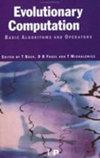基于子图的单目标突变用于解决双目标最小生成树问题
IF 3.4
2区 计算机科学
Q2 COMPUTER SCIENCE, ARTIFICIAL INTELLIGENCE
引用次数: 0
摘要
我们为采用进化计算高效逼近经典 NP 难多目标最小生成树问题(moMST)的帕累托集做出了贡献。更确切地说,在前期工作的基础上,我们分析了帕累托最优生成树的邻域结构,并根据所获得的洞察力设计了几种基于子图的高偏置突变算子。简而言之,这些算子用局部最优子树替换候选解决方案中(不)相连的子树。后一步(偏置)是通过将 Kruskal 的单目标 MST 算法应用于子图的加权和标量化来实现的。我们证明了所引入算子的运行时间复杂性结果,并研究了理想的帕累托效益特性。这一特性表明,突变体不会被其父图所支配。此外,我们还进行了广泛的实验基准研究,以展示算子的实际适用性。我们的研究结果证实,基于子图的算子在具有不同帕累托前沿形状的四类不同完整图上的函数评估方面,即使计算预算严重受限,也能击败文献中的基准算法。本文章由计算机程序翻译,如有差异,请以英文原文为准。
On Single-Objective Sub-Graph-Based Mutation for Solving the Bi-Objective Minimum Spanning Tree Problem
We contribute to the efficient approximation of the Pareto-set for the classical NP-hard multiobjective minimum spanning tree problem (moMST) adopting evolutionary computation. More precisely, by building upon preliminary work, we analyze the neighborhood structure of Pareto-optimal spanning trees and design several highly biased sub-graph-based mutation operators founded on the gained insights. In a nutshell, these operators replace (un)connected sub-trees of candidate solutions with locally optimal sub-trees. The latter (biased) step is realized by applying Kruskal's single-objective MST algorithm to a weighted sum scalarization of a sub-graph. We prove runtime complexity results for the introduced operators and investigate the desirable Pareto-beneficial property. This property states that mutants cannot be dominated by their parent. Moreover, we perform an extensive experimental benchmark study to showcase the operator's practical suitability. Our results confirm that the sub-graph-based operators beat baseline algorithms from the literature even with severely restricted computational budget in terms of function evaluations on four different classes of complete graphs with different shapes of the Pareto-front.
求助全文
通过发布文献求助,成功后即可免费获取论文全文。
去求助
来源期刊

Evolutionary Computation
工程技术-计算机:理论方法
CiteScore
6.40
自引率
1.50%
发文量
20
审稿时长
3 months
期刊介绍:
Evolutionary Computation is a leading journal in its field. It provides an international forum for facilitating and enhancing the exchange of information among researchers involved in both the theoretical and practical aspects of computational systems drawing their inspiration from nature, with particular emphasis on evolutionary models of computation such as genetic algorithms, evolutionary strategies, classifier systems, evolutionary programming, and genetic programming. It welcomes articles from related fields such as swarm intelligence (e.g. Ant Colony Optimization and Particle Swarm Optimization), and other nature-inspired computation paradigms (e.g. Artificial Immune Systems). As well as publishing articles describing theoretical and/or experimental work, the journal also welcomes application-focused papers describing breakthrough results in an application domain or methodological papers where the specificities of the real-world problem led to significant algorithmic improvements that could possibly be generalized to other areas.
 求助内容:
求助内容: 应助结果提醒方式:
应助结果提醒方式:


